人教版高二英语必修六语法点の虚拟语气
英语语法 虚拟语气的知识点归纳
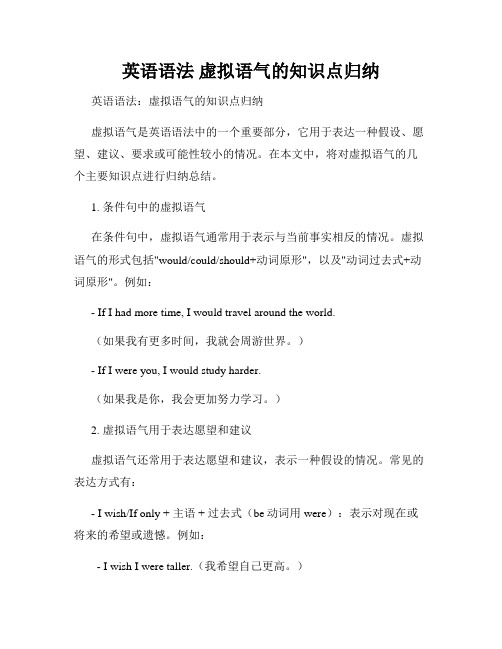
英语语法虚拟语气的知识点归纳英语语法:虚拟语气的知识点归纳虚拟语气是英语语法中的一个重要部分,它用于表达一种假设、愿望、建议、要求或可能性较小的情况。
在本文中,将对虚拟语气的几个主要知识点进行归纳总结。
1. 条件句中的虚拟语气在条件句中,虚拟语气通常用于表示与当前事实相反的情况。
虚拟语气的形式包括"would/could/should+动词原形",以及"动词过去式+动词原形"。
例如:- If I had more time, I would travel around the world.(如果我有更多时间,我就会周游世界。
)- If I were you, I would study harder.(如果我是你,我会更加努力学习。
)2. 虚拟语气用于表达愿望和建议虚拟语气还常用于表达愿望和建议,表示一种假设的情况。
常见的表达方式有:- I wish/If only + 主语 + 过去式(be动词用were):表示对现在或将来的希望或遗憾。
例如:- I wish I were taller.(我希望自己更高。
)- If only she could speak fluent English.(要是她能说一口流利的英语就好了。
)- It is time + 主语 + 过去式(should + 动词原形):用于表示现在或将来应该发生的动作。
例如:- It is time we started the meeting.(是时候开始会议了。
)- It is time you should apologize to her.(你应该向她道歉了。
)3. 虚拟语气在宾语从句中的使用在宾语从句中,若主句的动词表达了建议、命令、要求等含义时,宾语从句中的谓语动词常使用虚拟语气。
具体的用法如下:- 建议:suggest/recommend + (that) + 主语 + (should)+ 动词原形。
高中英语虚拟语气的用法归纳

高中英语虚拟语气的用法归纳以下是高中英语虚拟语气的用法归纳:虚拟语气是一种特殊的动词形式,表示假设、愿望、建议、命令、猜测等非真实的情况。
一、基本用法1. 与现在事实相反条件从句:If + 主语 + 动词过去式(be 动词用 were)主句:主语 + would/should/could/might + 动词原形例句:If I were you, I would study harder. (如果我是你,我会更努力学习。
)Wouldn't life be boring if we had everything we wanted? (如果我们想要什么就有什么,生活岂不是很无聊?)2. 与过去事实相反条件从句:If + 主语 + had + 过去分词主句:主语 + would/should/could/might + have + 过去分词例句:If I had known your phone number, I would have called you. (如果我知道你的电话号码,我就给你打电话了。
)Couldn't you have done better if you had tried harder? (如果你再努力些,难道不能做得更好吗?)3. 与将来事实相反条件从句:① If + 主语 + 动词过去式② If + 主语 + were to + 动词原形③ If + 主语 + should + 动词原形主句:主语 + would/should/could/might + 动词原形例句:If it rained tomorrow, we would stay at home. (如果明天下雨,我们就待在家里。
)If she were to come here tomorrow, I would be very happy. (如果她明天来这儿,我会非常高兴。
)If he should fail in the exam, how disappointed his parents would be!(要是他考试不及格,他父母该多失望啊!)二、固定搭配1. wish 后的宾语从句与现在事实相反:从句用一般过去时与过去事实相反:从句用过去完成时与将来事实相反:从句用 would/could + 动词原形例句:I wish I were as tall as you. (我希望我和你一样高。
高中英语知识点归纳虚拟语气的用法总结
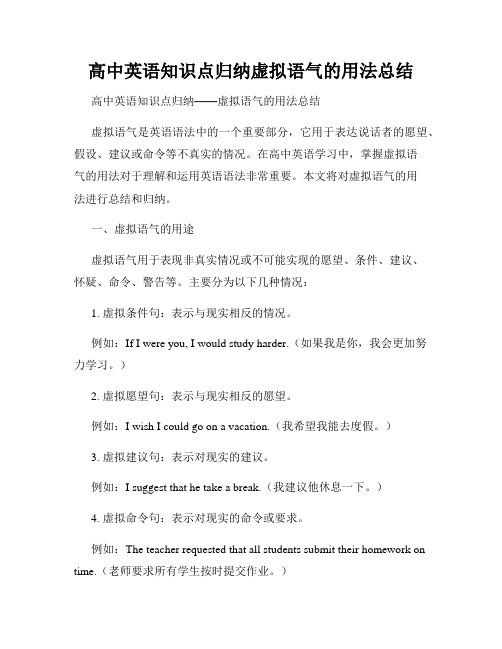
高中英语知识点归纳虚拟语气的用法总结高中英语知识点归纳——虚拟语气的用法总结虚拟语气是英语语法中的一个重要部分,它用于表达说话者的愿望、假设、建议或命令等不真实的情况。
在高中英语学习中,掌握虚拟语气的用法对于理解和运用英语语法非常重要。
本文将对虚拟语气的用法进行总结和归纳。
一、虚拟语气的用途虚拟语气用于表现非真实情况或不可能实现的愿望、条件、建议、怀疑、命令、警告等。
主要分为以下几种情况:1. 虚拟条件句:表示与现实相反的情况。
例如:If I were you, I would study harder.(如果我是你,我会更加努力学习。
)2. 虚拟愿望句:表示与现实相反的愿望。
例如:I wish I could go on a vacation.(我希望我能去度假。
)3. 虚拟建议句:表示对现实的建议。
例如:I suggest that he take a break.(我建议他休息一下。
)4. 虚拟命令句:表示对现实的命令或要求。
例如:The teacher requested that all students submit their homework on time.(老师要求所有学生按时提交作业。
)5. 虚拟警告句:表示对现实的警告或威胁。
例如:If you don't stop talking, I will call the police.(如果你不停止讲话,我会报警。
)二、虚拟语气的形式1. 虚拟语气在动词的形态上表现为过去式(一般过去时或过去完成时)。
例如:I suggested that he go to the library.(我建议他去图书馆。
)2. 虚拟语气在动词的形态上表现为"were"而不是"was"。
例如:If I were you, I would apologize.(如果我是你,我会道歉。
)3. 虚拟语气在情态动词的用法上表现为"should" + 动词原形。
高中英语知识点归纳虚拟语气的用法与句型
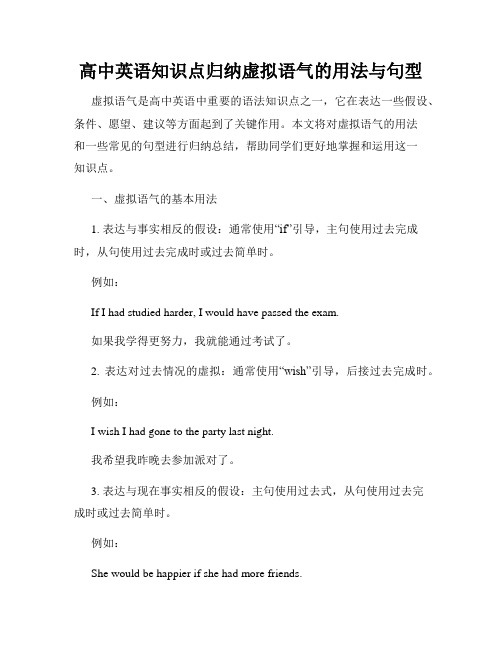
高中英语知识点归纳虚拟语气的用法与句型虚拟语气是高中英语中重要的语法知识点之一,它在表达一些假设、条件、愿望、建议等方面起到了关键作用。
本文将对虚拟语气的用法和一些常见的句型进行归纳总结,帮助同学们更好地掌握和运用这一知识点。
一、虚拟语气的基本用法1. 表达与事实相反的假设:通常使用“if”引导,主句使用过去完成时,从句使用过去完成时或过去简单时。
例如:If I had studied harder, I would have passed the exam.如果我学得更努力,我就能通过考试了。
2. 表达对过去情况的虚拟:通常使用“wish”引导,后接过去完成时。
例如:I wish I had gone to the party last night.我希望我昨晚去参加派对了。
3. 表达与现在事实相反的假设:主句使用过去式,从句使用过去完成时或过去简单时。
例如:She would be happier if she had more friends.如果她有更多朋友,她会更开心。
4. 表达对现在情况的虚拟:通常使用“wish”引导,后接过去时。
例如:I wish I were a bird and could fly in the sky.我希望我是一只鸟,可以在天空中飞翔。
5. 表达对将来的不可能或不太可能的情况:主句使用过去式,从句使用过去完成时。
例如:If I were you, I would not go to that dangerous place.如果我是你,我不会去那个危险的地方。
二、常见虚拟语气句型1. 虚拟语气与建议:It is important (necessary, advisable, essential, etc.) that + 主语 + (should) + 动词原形例如:It is necessary that you (should) finish your homework before playing games.你在玩游戏前完成作业是必要的。
人教版高二英语必修6Unit1 虚拟语气2 课件

_I_w__o_u_ld_ kick it with who I wanted
And I__w__o_u_ld_ ever get confronted for it
If I were…. I would…
虚拟条件句中的 主句中的谓语
谓语动词
动词
与现在事实相反 did/were
的假设(present)
would/might/ could do
与过去事实相反 had done
的假设(past)
were/did
与将来事实相反 的假设(future)
were to do
should do
would/might /could have done
would/might /could do
I wish I _w_e_r_e_/c_o_u_l_d_b_e_ (be) thinner.
2. I was really anxious about you. You
_o_u_g_h_t_n_’t__to_/_s_h_o_u_ld__n_’t_h__a_v_e_l_eft (leave) home without a word.
3. -- How did you do on the test? -- Not so well. I
表示与过去事实相反 had done (past)
表示与将来事实相反 would/could do (future)
We students have so much homework everyday. If only Ic_o_u_l_d_r_e_m__em__b_e_r___ (remember) things as quickly as a computer.
高二英语语法复习 虚拟语气和倒装句 人教版
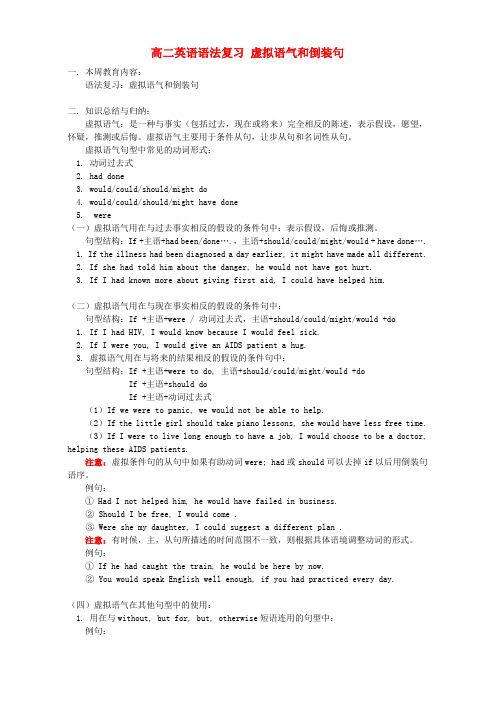
高二英语语法复习虚拟语气和倒装句一. 本周教育内容:语法复习:虚拟语气和倒装句二. 知识总结与归纳:虚拟语气:是一种与事实(包括过去,现在或将来)完全相反的陈述,表示假设,愿望,怀疑,推测或后悔。
虚拟语气主要用于条件从句,让步从句和名词性从句。
虚拟语气句型中常见的动词形式:1. 动词过去式2. had done3. would/could/should/might do4. would/could/should/might have done5. were(一)虚拟语气用在与过去事实相反的假设的条件句中:表示假设,后悔或推测。
句型结构:If +主语+had been/done….,主语+should/could/might/would + have done….1. If the illness had been diagnosed a day earlier, it might have made all different.2. If she had told him about the danger, he would not have got hurt.3. If I had known more about giving first aid, I could have helped him.(二)虚拟语气用在与现在事实相反的假设的条件句中:句型结构:If +主语+were / 动词过去式,主语+should/could/might/would +do1. If I had HIV, I would know because I would feel sick.2. If I were you, I would give an AIDS patient a hug.3. 虚拟语气用在与将来的结果相反的假设的条件句中:句型结构:If +主语+were to do, 主语+should/could/might/would +doIf +主语+should doIf +主语+动词过去式(1)If we were to panic, we would not be able to help.(2)If the little girl should take piano lessons, she would have less free time.(3)If I were to live long enough to have a job, I would choose to be a doctor, helping these AIDS patients.注意:虚拟条件句的从句中如果有助动词were; had或should可以去掉if以后用倒装句语序。
高中英语人教版-语法虚拟语气--精编版 课件
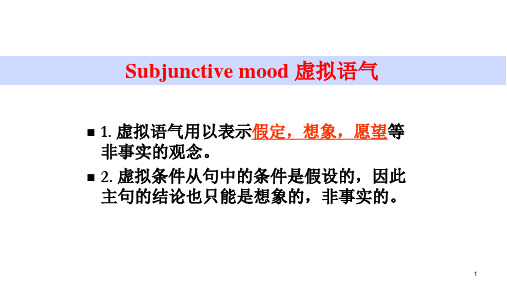
★Had it not been for your help, we couldn’t have finished the work ahead of time.
If it had not been for your help,…… ★Were it not for the rain, the crops would die.
主语从句中的虚拟语气 宾语从句中的虚拟语气 同位语从句中的虚拟语气
2
一、虚拟语气在条件状语从句中的用法
条件 If 从句的谓语形 从句 式
主句的谓语形式
现在 V+ ed (were)
would/could/should/ might +V (原)
过去
had done
would/could/should/ might+have+p.p.
4
1.2与过去事实相反:表示庆幸,遗憾,惋惜 If you had listened to me even a little bit, you would not have been in such a trouble.
如果你听了我一点点的话,
你就不将来事实相反 If I should go to the moon tomorrow, I might take some pictures and send them to you. 如果我明天就跑到月亮上的话, 我就拍些照片,然后发给你。
13
1.5 虚拟语气的倒装
★Had it not been for your help, we couldn’t have finished the work ahead of time. 要不是你的帮助,我们就不可能提前完成任务。
高中英语虚拟语气知识点总结精华(附答案)

高中英语虚拟语气知识点总结精华(名师总结必考语法知识点)第一节语气英语的动词一般可带有三种不同的语气:陈述语气,祈使语气和虚拟语气。
不同的语气用动词的不同形式(有的还借助句法形式)来表示。
第二节虚拟语气的概念虚拟语气是一种特殊的动词形式,一是用来表示说话人所说的话不是一个事实,而是一种假设、猜测、怀疑等(在条件从句中或让步状语从句中);一是表示说话人的愿望、要求、命令、建议等(在宾语从句、表语从句、同位语从句)。
它能实现下列交际功能:a.用来表达一个假设或纯粹的意愿(这种假设或意愿在多数情况下是与事实相反或不太可能实现的。
b. 经常用来缓和语气,使之更加委婉、礼貌、得体,使句子带有推测性和尝试性。
c. 表示烦恼、不耐烦等情绪。
d. 表示适度的责备或批评。
e. 表示美好的祝愿或祝福。
学习虚拟语气在条件句中的用法之前我们必须清楚条件句的种类:条件句有真实条件句与非真实条件句(或称虚拟条件句)两种。
真实条件句所表的假设是可能发生或实现的,句中的条件从句与结果主句都用陈述语气。
如:If it doesn’t rain tomorrow, I wi ll go for a picnic. 假若明天不下雨,我就去野餐。
Oil floats if you pour it on water. 你如把油倒在水里,油就浮起来。
虚拟条件句所表的假设则是不可能或不大可能发生或实现的,句中的条件从句与结果主句皆须用虚拟语气。
第三节虚拟语气在条件句中NOTE:使用虚拟条件句要注意的几点:1.当条件状语从句表示的行为和主句表示的行为所发生的时间不一致时,被称为:错综时间条件句“,动词的形式要根据它所表示的时间作出相应的调整.If you had followed my advice , you would be better now.如果你听我的建议,你现在就会痊愈了.2.在条件句中,可省略if,把were ,had, should 提到句首,变为倒装句式.(后面详细讲解)If you had come earlier, you would have met him.Had you come earlier, you would have met him.1. 与现在事实相反的虚拟条件句,条件从句的谓语用动词的过去式(be的过去式用were), 主句的谓语用should (would, might,could)+动词原形。
高中英语虚拟语气知识点总结
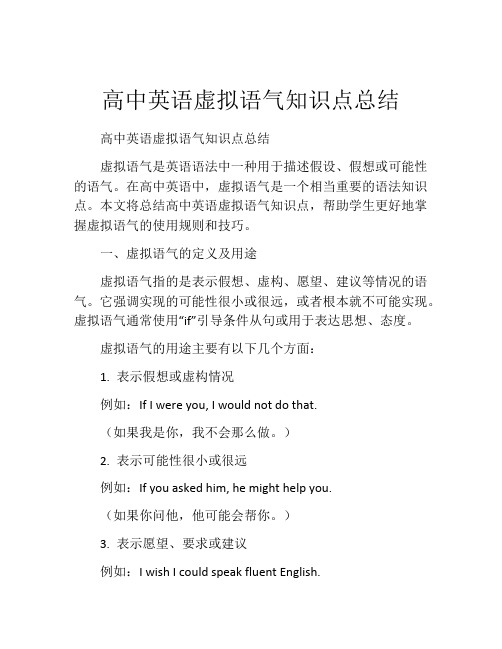
高中英语虚拟语气知识点总结高中英语虚拟语气知识点总结虚拟语气是英语语法中一种用于描述假设、假想或可能性的语气。
在高中英语中,虚拟语气是一个相当重要的语法知识点。
本文将总结高中英语虚拟语气知识点,帮助学生更好地掌握虚拟语气的使用规则和技巧。
一、虚拟语气的定义及用途虚拟语气指的是表示假想、虚构、愿望、建议等情况的语气。
它强调实现的可能性很小或很远,或者根本就不可能实现。
虚拟语气通常使用“if”引导条件从句或用于表达思想、态度。
虚拟语气的用途主要有以下几个方面:1. 表示假想或虚构情况例如:If I were you, I would not do that.(如果我是你,我不会那么做。
)2. 表示可能性很小或很远例如:If you asked him, he might help you.(如果你问他,他可能会帮你。
)3. 表示愿望、要求或建议例如:I wish I could speak fluent English.(我希望我能说流利的英语。
)二、虚拟语气的形式虚拟语气形式主要有以下几种:1. 虚拟语气的过去式:在虚拟语气中,一般用过去式来表示对现在或未来的虚拟。
例如:If I had more time, I would read more books.(如果我有更多时间,我就会多看书。
)2. 虚拟语气的过去完成式:过去完成式用于表示“如果过去已经发生了某些事情,结果会是怎样”。
例如:If I had studied harder in high school, I would have gone to a better college.(如果我在高中时学习更努力,我就能进入更好的大学。
)3. 虚拟语气的“would + 动词原形”形式:“would +动词原形”形式通常用于表示愿望、要求、建议或者可能性。
例如:I wish you would stop smoking.(我希望你戒烟。
)If you would like to come, you are welcome.(如果你愿意来,欢迎你。
人教版高二寒假教材讲义Lesson6虚拟语气-教师版
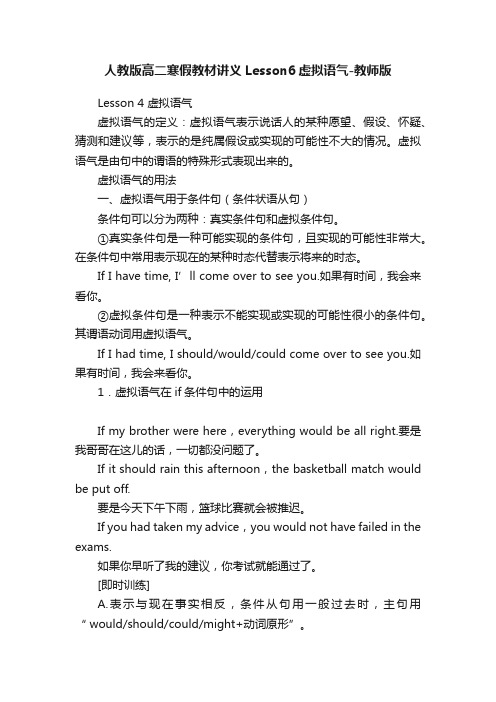
人教版高二寒假教材讲义Lesson6虚拟语气-教师版Lesson 4 虚拟语气虚拟语气的定义:虚拟语气表示说话人的某种愿望、假设、怀疑、猜测和建议等,表示的是纯属假设或实现的可能性不大的情况。
虚拟语气是由句中的谓语的特殊形式表现出来的。
虚拟语气的用法一、虚拟语气用于条件句(条件状语从句)条件句可以分为两种:真实条件句和虚拟条件句。
①真实条件句是一种可能实现的条件句,且实现的可能性非常大。
在条件句中常用表示现在的某种时态代替表示将来的时态。
If I have time, I’ll come over to see you.如果有时间,我会来看你。
②虚拟条件句是一种表示不能实现或实现的可能性很小的条件句。
其谓语动词用虚拟语气。
If I had time, I should/would/could come over to see you.如果有时间,我会来看你。
1.虚拟语气在if条件句中的运用If my brother were here,everything would be all right.要是我哥哥在这儿的话,一切都没问题了。
If it should rain this afternoon,the basketball match would be put off.要是今天下午下雨,篮球比赛就会被推迟。
If you had taken my advice,you would not have failed in the exams.如果你早听了我的建议,你考试就能通过了。
[即时训练]A.表示与现在事实相反,条件从句用一般过去时,主句用“ would/should/could/might+动词原形”。
①If I (be) you, I (try) it again.②If he (be) free, he (go) with you.B.表示与过去事实相反,条件从句用“had+ 过去分词”,主句用“ would/should/could/might+ have+过去分词”。
高中英语知识点归纳虚拟语气的用法

高中英语知识点归纳虚拟语气的用法虚拟语气是英语语法中的一个重要概念,用于表达虚假、条件或假设等非真实情况。
在高中英语教学中,虚拟语气的用法被广泛涉及。
本文将归纳总结高中英语中常见的虚拟语气用法,以便帮助学生更好地掌握和应用。
一、虚拟语气在条件句中的用法1. 第一类虚拟条件句第一类虚拟条件句表示与现在事实相反的假设情况,即主句谓语动词用一般过去时,条件句用“动词过去式”或“were”。
例句1:If I had more time, I would travel around the world.如果我有更多的时间,我会周游世界。
例句2:If he were here, he would help you.如果他在这里,他会帮助你。
2. 第二类虚拟条件句第二类虚拟条件句表示与过去事实相反的假设情况,即主句谓语动词用“过去完成时”,条件句用“过去完成时”或“动词过去完成式”。
例句1:If I had studied harder, I would have passed the exam.如果我学得更刻苦,我就会通过考试了。
例句2:If she had taken the bus, she wouldn't have been late.如果她坐公交车,她就不会迟到了。
二、虚拟语气在建议、命令和要求中的用法虚拟语气在建议、命令和要求中的用法是表示一种非真实或非直接的语气,用于表达对诉求对象的建议、命令或要求。
例句1:I suggest that he go to bed early.我建议他早点上床睡觉。
例句2:The teacher insisted that the students hand in their homework on time.老师坚持要求学生们按时交作业。
三、虚拟语气在感叹句中的用法虚拟语气在感叹句中的用法用于表达对现实情况的不满或对希望的夸大。
例句1:If only I were a bird and could fly freely in the sky!如果我是一只鸟,能自由地在天空中飞翔该多好啊!例句2:How I wish I had a magic wand to make all my dreams come true!我多希望我有一根魔法棒,让我的梦想都实现!四、虚拟语气在建立条件句中的用法虚拟语气在建立条件句中的用法用于建立一种假设条件,以进一步推断结果。
高中英语知识点归纳虚拟语气的用法及常见表达方式

高中英语知识点归纳虚拟语气的用法及常见表达方式虚拟语气在高中英语中是一个重要的语法知识点。
它在表达与现实相反的情况、假设、建议和愿望等方面起到了重要作用。
本文将详细介绍虚拟语气的用法及常见表达方式。
一、虚拟语气的基本形式在英语中,虚拟语气的基本形式包括虚拟条件句和虚拟语气在从句中的使用。
1. 虚拟条件句虚拟条件句通常包括三个主要部分:if引导的条件从句、主句中的would/should/could/might以及从句中的动词形式(常为过去式或were)。
例如:- If I had more money, I would travel around the world.(如果我有更多的钱,我会周游世界。
)2. 虚拟语气在从句中的使用虚拟语气在从句中的使用主要是通过动词的变化形式来表达。
常见的动词形式包括:过去式、were(用于所有人称)、should/ought to。
例如:- I wish I could speak fluent French.(我希望我能说一口流利的法语。
)二、虚拟语气的用法虚拟语气在英语中的使用具有一定的规则和情境。
下面将介绍几种常见的情况。
1. 表达与现实相反的情况- If I were you, I would quit that job immediately.(如果我是你,我会立刻辞职。
)该句中,使用了“were”而不是“was”,表示与当前事实相反的情况。
2. 表达假设和想象- If I had a time machine, I would go back to the past.(如果我有时光机器,我会回到过去。
)该句中,使用了“had”而不是“have”,表示假设的情况。
3. 表达建议和命令- The teacher suggested that we should study harder for the exam.(老师建议我们应该更加努力地学习考试。
)该句中,使用了“should”来表示建议。
高中英语知识点归纳语法虚拟语气的使用与变化

高中英语知识点归纳语法虚拟语气的使用与变化英语知识点归纳:语法虚拟语气的使用与变化虚拟语气(Subjunctive Mood)是英语语法中的一种特殊形式,用来表示虚构、非事实或假设的情况。
本文将对英语中虚拟语气的使用和变化进行归纳。
一、虚拟语气的用途1. 表达愿望和建议:- I wish/If only + 过去式:表达对过去情况的遗憾和不满。
例如:I wish I had studied harder for the exam.(我希望我当时能更努力地学习。
)- Would rather (that) + 主语 + 过去式:表达对现在或将来情况的偏好。
例如:I would rather you came with us.(我宁愿你和我们一起去。
)- It's time (that) + 主语 + 过去式:表示现在是做某事的时候。
例如:It's time you went to bed.(现在是你上床睡觉的时候了。
)2. 表达虚构的情况:- If + 主语 + 过去式,主语 + would/could + 动词原形:表示与现在事实相反的假设情况。
例如:If I were you, I would apologize.(如果我是你,我会道歉。
)3. 表达建议、要求、命令等:- It is important/necessary/advisable/essential... + that + 主语 +(should)+ 动词原形:表示建议或要求。
例如:It is necessary that he (should) finish the task on time.(他必须按时完成任务。
)二、虚拟语气的变化形式1. 一般现在时和一般过去时:- 一般现在时变为虚拟语气时,动词be的过去式用were;- 一般过去时变为虚拟语气时,动词的过去式使用过去完成时的形式。
2. 现在进行时和过去进行时:- 现在进行时变为虚拟语气时,be动词的现在分词形式变为were。
必修6 unite1-2语法虚拟语气
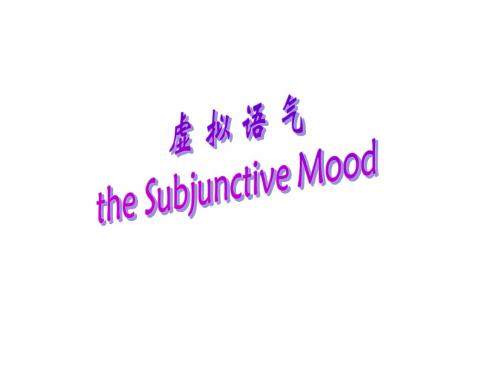
虚拟语气
If型特例1:混杂条件句:
定义:从句与主句的动作发生的时间不同
If they had studied hard, they could do it easily now.
与过去相反
. ★If the flower had been watered, it ______ now. A. wouldn’t die B. is dead C. had been dead D. will not die
虚拟语气
If 型
[例句] 1. If you had come a few minutes earlier, you would have met him. 要是你早来几分钟的话,你就能见到他了。(与过 去事实相反) 2. If it were sunny tomorrow, I would come to see you. 明天要是天气好的话,我来看你。(与将来事实可 能相反) 3. If I were you, I would go at once. 假如我是你的话,我会马上走。(与现在事实相反, 事实上我不可能是你)
A. was
B. was to be
C. be
D. must be
3.He had an idea that we ______ by bike. A. shall go B. go C. went D. would go
4.My suggestion is that the meeting ______ off till tomorrow. A. to put B. be put C. should put D. be putting
虚拟语气
2. Should + V 型 在宾语从句,表语从句,同位语从句 及主语从句中 句型 it is necessary/strange/…that +从句
人教版高二英语必修六语法点の虚拟语气
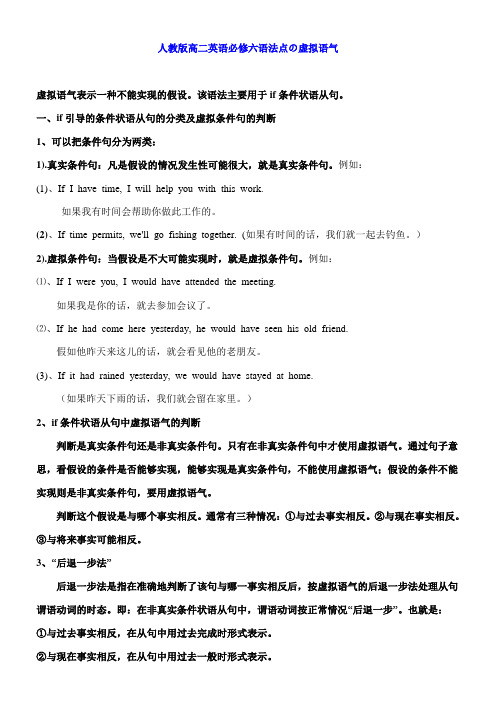
人教版高二英语必修六语法点の虚拟语气虚拟语气表示一种不能实现的假设。
该语法主要用于if条件状语从句。
一、if引导的条件状语从句的分类及虚拟条件句的判断1、可以把条件句分为两类:1).真实条件句:凡是假设的情况发生性可能很大,就是真实条件句。
例如:(1)、If I have time, I will help you with this work.如果我有时间会帮助你做此工作的。
(2)、If time permits, we'll go fishing together. (如果有时间的话,我们就一起去钓鱼。
)2).虚拟条件句:当假设是不大可能实现时,就是虚拟条件句。
例如:⑴、If I were you, I would have attended the meeting.如果我是你的话,就去参加会议了。
⑵、If he had come here yesterday, he would have seen his old friend.假如他昨天来这儿的话,就会看见他的老朋友。
(3)、If it had rained yesterday, we would have stayed at home.(如果昨天下雨的话,我们就会留在家里。
)2、if条件状语从句中虚拟语气的判断判断是真实条件句还是非真实条件句。
只有在非真实条件句中才使用虚拟语气。
通过句子意思,看假设的条件是否能够实现,能够实现是真实条件句,不能使用虚拟语气;假设的条件不能实现则是非真实条件句,要用虚拟语气。
判断这个假设是与哪个事实相反。
通常有三种情况:①与过去事实相反。
②与现在事实相反。
③与将来事实可能相反。
3、“后退一步法”后退一步法是指在准确地判断了该句与哪一事实相反后,按虚拟语气的后退一步法处理从句谓语动词的时态。
即:在非真实条件状语从句中,谓语动词按正常情况“后退一步”。
也就是:①与过去事实相反,在从句中用过去完成时形式表示。
高中语气虚拟知识点总结

高中语气虚拟知识点总结一、虚拟语气的基本概念1. 虚拟语气是用来表达说话者所希望或假设的情况,而不是真实的情况。
它通常出现在条件句、宾语从句和主语从句中。
2. 虚拟语气的形式包括过去时、过去完成时和 should/would/could/might+动词原形等形式。
3. 在条件句中,如果条件句是虚拟的,那么其结果句也要使用虚拟语气,即用过去时(be 动词用were)、过去完成时或 should/would/could/might+动词原形等形式。
二、虚拟语气在宾语从句中的用法1. 在宾语从句中,如果主句是虚拟的,那么宾语从句也要使用虚拟语气。
比如:主句:I wish that he were here.宾语从句: He wishes (that) he could go with you.2. 特殊的动词词组,如:suggest, propose, demand, insist, mandate等动词后的宾语从句要使用虚拟语气。
比如:They demanded that he apologize for his mistake.3. 如果宾语从句表示的是将来的情况,那么要使用should/would/could/might+动词原形等形式,表示愿望或假设。
比如:I suggested that he should visit his aunt next week.三、虚拟语气在主语从句中的用法1. 在主语从句中,如果主语从句是虚拟的,那么谓语动词也要使用虚拟语气。
比如:It is essential that he be here on time.2. 特殊的情况下,虚拟语气还可以出现在“it is +形容词+that从句”结构中,表示建议或要求。
比如:It is necessary that he complete the task by tomorrow.四、虚拟语气在条件句中的用法1. 虚拟条件句表示与现实相反的情况,通常使用过去式(be动词用were)或should/would/could/might+动词原形等形式。
高中英语知识点归纳虚拟语气的种类与用法

高中英语知识点归纳虚拟语气的种类与用法虚拟语气是英语中常见的一种语法现象,用于表示与事实相反、假设或建议等非真实情况。
在高中英语学习中,掌握虚拟语气的种类与用法对于提高语言表达能力至关重要。
本文将归纳总结高中英语中常见的虚拟语气种类及其用法。
一、虚拟语气的种类1. 与过去事实相反的虚拟该类虚拟语气用于表达对过去事实的否定、怀疑或假设,通常由“should/ought to + have + 过去分词”构成。
例如:He should have come to the party last night.(他本应该昨晚来参加派对的)I wish I had studied harder for the exam.(我希望我当时更努力地学习)2. 与现在事实相反的虚拟该类虚拟语气用于表达对现在事实的否定、怀疑或假设,通常由“动词原形+宾语+过去式”构成。
例如:If I were you, I would apologize.(如果我是你,我会道歉)She wishes she had more time for hobbies.(她希望她有更多的时间去爱好)3. 与将来事实相反的虚拟该类虚拟语气用于表达对将来事实的否定、怀疑或假设,通常由“should/shall/would + 动词原形”构成。
例如:If it should rain tomorrow, we would have to cancel the picnic.(如果明天下雨的话,我们将不得不取消野餐)I would help you if I had the time.(如果我有时间的话,我会帮助你的)4. 与现在事实相反的虚拟假设该类虚拟语气用于表达对现在事实的否定、怀疑或假设,通常由“were/shou ld + 动词原形”构成,用于表示与现在事实相反的情况。
例如:If I were you, I would quit that job.(如果我是你,我会辞职的)It is high time that he should start studying.(早该是他开始学习的时候了)二、虚拟语气的用法1. 表示假设和建议虚拟语气常用于表示假设和建议,帮助我们在语言表达中更加灵活地运用条件句和建议句。
高中英语虚拟语气语法总结

高中英语虚拟语气语法总结高中英语虚拟语气语法总结一、引言在高中英语语法中,虚拟语气是一个重要的知识点。
掌握虚拟语气的用法不仅可以提高英语表达的准确性和流畅性,还可以帮助理解许多英语文学作品的深层次含义。
本文将详细介绍高中英语虚拟语气的用法及其在句子中的应用。
二、语法总结1、虚拟语气的使用虚拟语气在英语中表示一种假设或非真实的条件,通常用于表达建议、愿望、假设或怀疑等。
根据不同的情境和表达需要,虚拟语气有多种形式,下面列举几种常用的虚拟语气表达方式:1、与现在事实相反:If I had time, I would go for a walk.2、与过去事实相反:If he had known the answer, he would have replied.3、与未来事实相反:If it were to rain tomorrow, we would stay at home.4、表达建议或请求:If it were you, I would choose the blue dress.2、语气助词的运用虚拟语气在句子中的运用常常与特定的语气助词结合。
以下是几种常见的语气助词及其功能:1、if条件从句:用于表达条件或假设,如上述例子所示。
2、Otherwise:用于表达相反的情况或假设,例如:Otherwise I would have told you the truth.3、Otherwise:用于表达相反的情况或假设,例如:Without your help,I would not have achieved this success.3、句子结构与语法规则虚拟语气的句子结构及其语法规则对于正确使用非常重要。
以下是几个需要注意的要点:1、主句和从句的时态关系:在含有虚拟语气的句子中,主句和从句的时态通常是不一致的,以表达假设或非真实的情况。
2、主谓结构:虚拟语气的主谓结构通常与陈述语气的结构不同,特别是当从句表达非真实的情况时,主谓结构需要进行相应的调整。
- 1、下载文档前请自行甄别文档内容的完整性,平台不提供额外的编辑、内容补充、找答案等附加服务。
- 2、"仅部分预览"的文档,不可在线预览部分如存在完整性等问题,可反馈申请退款(可完整预览的文档不适用该条件!)。
- 3、如文档侵犯您的权益,请联系客服反馈,我们会尽快为您处理(人工客服工作时间:9:00-18:30)。
人教版高二英语必修六语法点の虚拟语气人教版高二英语必修六语法点の虚拟语气虚拟语气表示一种不能实现的假设。
该语法主要用于if条件状语从句。
一、if引导的条件状语从句的分类及虚拟条件句的判断1、可以把条件句分为两类:1).真实条件句:凡是假设的情况发生性可能很大,就是真实条件句。
例如:(1)、If I have time, I will help you with this work.如果我有时间会帮助你做此工作的。
(2)、If time permits, we’ll go fishing together. (如果有时间的话,我们就一起去钓鱼。
)2).虚拟条件句:当假设是不大可能实现时,就是虚拟条件句。
例如:⑴、If I were you, I would have attended the meeting.如果我是你的话,就去参加会议了。
⑵、If he had come here yesterday, he would have seen his old friend.假如他昨天来这儿的话,就会看见他的老朋友。
(3)、If it had rained yesterday, we would have stayed at home.(如果昨天下雨的话,我们就会留在家里。
)2、if条件状语从句中虚拟语气的判断判断是真实条件句还是非真实条件句。
只有在非真实条件句中才使用虚拟语气。
通过句子意思,看假设的条件是否能够实现,能够实现是真实条件句,不能使用虚拟语气;假设的条件不能实现则是非真实条件句,要用虚拟语气。
判断这个假设是与哪个事实相反。
通常有三种情况:①与过去事实相反。
②与现在事实相反。
③与将来事实可能相反。
3、“后退一步法”后退一步法是指在准确地判断了该句与哪一事实相反后,按虚拟语气的后退一步法处理从句谓语动词的时态。
即:在非真实条件状语从句中,谓语动词按正常情况“后退一步”。
也就是:①与过去事实相反,在从句中用过去完成时形式表示。
②与现在事实相反,在从句中用过去一般时形式表示。
③与将来事实可能相反,在从句中用过去将来时形式表示。
主句中则用情态动词would, should, could 等加一个与从句一致的动词形式。
例:(1) 与过去事实相反的虚拟语气。
如:If I had seen the film, I would have told you about it.我如果看过这场电影,我会把电影内容告诉你了。
If I had got there earlier, I would have met Mr. Li.如果我早点到那儿,我就会会到了李先生。
(2) 与现在事实相反的虚拟语气。
如:If he were free, he would help us.要是他有空的话,它会帮助我们的。
If he studied at this school, he would know you well.如果他在这所学校学习的话,它会对你很熟悉。
(3) 与将来事实相反的虚拟语气。
如:If he should go to Qing Hua University, he would make full use of his time.如果他要上清华大学的话,他就会充分利用他的时间了。
If he were to come here, he would tell us about it.如果他要来的话,他会通知我们一声。
例题分析:1、—If he __________,he __________ that food.—Luckily he was sent to the hospital immediately.A. was warned,would not takeC. would be warned,had not taken此题应选B。
该题考查与过去事实相反的虚拟语气:此时条件从句的谓语用had+过去分词,主句的谓语用would(should,could,might)+have+过去分词。
B. had been warned,would not have taken D. would have been warned,had not taken2、If he was here,he __________ us how to do it.A. told此题应选B。
该题考查与现在事实相反的虚拟语气:此时条件从句的谓语动词用过去式,主句的谓语则要用would (should,could,might)+动词原形。
3、If we __________ 200 years old,we __________ everything.A. were to be,could changeC. were,would have changed此题应选A。
该题考查与将来事实相反的虚拟语气,此时的主句谓语通常用would(should,could,might)+动词原形1. If she had worked harder,she __________.A. would succeedC. should succeed B. had succeededD. would have succeeded B. had been,changed D. should be,changed B. would tell C. had told D. have told2. If my lawyer ________ here last Saturday,he _________ me from going.A. had been; would have preventedB. had been; would preventC. were; wouldD. were; would have prevented3. I didn’t see your sister at the meeting. If she __________,she would have met my brother.A. has comeB. did comeC. cameD. had come4. You didn’t let me drive. If we ________ in turn,you__________ so tired.A. drove; didn’t getB. drove; wouldn’t getC. were driving; wouldn’t getD. had driven; wouldn’t have got答案:1. D 2. A 3. D 4. D二、使用虚拟条件句要注意的几点:1.当条件状语从句表示的行为和主句表示的行为所发生的时间不一致时,被称为:错综时间条件句“,动词的形式要根据它所表示的时间作出相应的调整.①从句的动作与过去事实相反,而主句的动作与现在或现在正在发生的事实不符。
如:If I had worked hard at school, I would be an engineer, too.如果我在学校学习刻苦的话,我现在也会使工程师了If they had informed us, we would not come here now.如果他们通知过我们的话,我们现在就不会来这里了。
If you had followed my advice , you would be better now.如果你听我的建议,你现在就会痊愈了。
If you had studied hard before, you would be a college student now.如果你努力学习的话,你现在就会是大学生了。
②从句的动作与现在事实相反,而主句的动作与过去事实不符。
如:If he were free today, we would have sent him to Beijing.如果他今天有空的话,我们会已经派他去北京了。
If he knew her, he would have greeted her.要是他认识她的话,他肯定会去问候她了。
③从句的动作与过去发生的情况相反,而主句的动作与现在正在发生的情况相反。
如:If it had not been raining too much, the crops would be growing much better.如果天不下太多的雨的话,庄家会长得更好。
If he had been working hard, he would be working in the office now.要是他工作一直努力的话,他现在已进了办公室了。
2、当虚拟条件句的谓语动词含有were, should, had时,if可省略,而将were, should, had等词置于句首。
如:Were I at school again, I would study harder.Had you come earlier, you would have met him.Should it rain tomorrow, we would not go climbing.Should he agree to go there, we would send him there.要是他答应去的话,我们就派他去。
Were she here, she would agree with us.如果她在这儿的话,她会同意我们的。
Had he learned about computers, we would have hired him to work here.如果她懂一些电脑知识的话,我们会已经聘用他来这里工作了。
3、有时,虚拟条件句中,主、从句可以省略其中的一个,来表示说话人的一种强烈的感情。
①省略从句He would have finished it. 他本该完成了。
You could have passed this exam. 你应该会通过这次考试了。
②省略主句If I were at home now. 要是我现在在家里该多好啊。
If only I had got it. 要是我得到它了该多好啊。
三、宾语从句中的虚拟语气1.英语中,一个坚持insist; 两个命令order, command ; 三条建议suggest , advise, propose; 六项要求demand, request, require, ask; urge, desire + (that) sb. (should) do sth. 如:The teacher advised that we should make good use of every minute here.老师劝我们要好好地利用在这儿的每一分钟。
